
 |
|
|
|
DVD releases regularly include non-studio experimental and underground pictures, the quality of which ranges from very good to, frankly, why-are-we-watching this? Sorting through them all becomes worthwhile when something truly exceptional is released. A couple of years ago The Milestone Cinematheque premiered UCLA graduate student Charles Burnett's Killer of Sheep, an insightful drama about African American life in South Central Los Angeles. Now Milestone goes across town to U.S.C. to bring us an even more accomplished production, Kent MacKenzie's The Exiles. Kent MacKenzie's story covers twelve hours in the lives of a group of young Native Americans who live in the long-gone Bunker Hill area of downtown Los Angeles. The low budget picture is filmed on the cuff but needs absolutely no apologies. The cast of unprofessionals give natural and unforced performances free of the problems we associate with low-end filmmaking. We feel as if we're looking in on private lives in a culture within a culture that nobody knew was there. MacKenzie's show was filmed between 1957 and 1960, before the French New Wave, the New American Cinema or any such "movement" that supposedly set the trend toward naturalism. Against a soundtrack of guitar-driven rock by The Revels, The Exiles is like an untold chapter of American Graffiti. 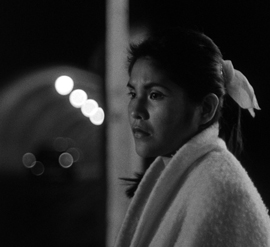
We follow several young American Indians who have settled uneasily in the low-rent Bunker Hill district. Few hold jobs for very long; the men have an acute awareness of their outsider existence. A couple of un-idealized flashbacks are set back at an Arizona reservation. They leave home out of boredom and may return for the same reason. The men lounge about reading comic books, listening to the radio and eating; when night comes they go out looking for excitement, paying their way with pocket change taken from their wives and girlfriends. With barely enough money for gas (at 26 cents a gallon), the men frequent bars, trying to drink without paying. Two inebriated buddies take a long walk through the Third Street Tunnel to a poker game, convinced that this is their lucky night. It isn't. Lonely wife Yvonne (Yvonne Williams) wanders Hill Street until she finds a movie to see. Hours later she'll be walking slowly home, gazing at the expensive consumer goods in the storefront windows. The pedestrians pass frequently by Angels Flight, the funicular railway that offers a 5-cent alternative to climbing steep Bunker Hill. At its bottom is a large open-air market -- with 1957 prices that definitely tell us that we're in a bygone era. Other would-be Casanovas pick up two girls by dancing to a jukebox; the dates act coy but begin making out as soon as they're installed in the boys' convertible. The girls have been invited for company, but also so they can be tricked into paying for a fill-up; when one plays hard-to-get and refuses to come out of the filling station's waiting room, they just leave her stranded. 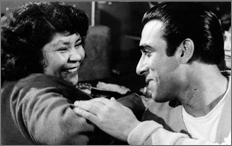
At two A.M. the bars close. The cops show up to haul drunks and troublemakers off to jail in what appears to be a regular ritual. We see real arrests; dozens of patrons without any place to go will just loiter around on the street for hours, as if disoriented. A group of Indians with wheels cruise up to "Hill X", a drinking spot adjacent to Chavez Ravine. They beat tribal drums, make noise, make out and start fights. When the sun comes up they retreat once more to Bunker Hill. Sometimes the soundtrack is given over to very natural-sounding interior monologues. One man talks about being in the Navy and running up to L.A. repeatedly to visit a girl. Yvonne voices her wan hope that her man will shake free of his lassitude and start thinking more of his family. None of these speeches carries much enthusiasm or ambition; this is a place with few opportunities for advancement. The Exiles is an eye opener, an ethnographic account nobody expects to see. The 35mm cinematography will impress anyone accustomed to B&W exploitation pictures filmed in low-light conditions: the whole film is sharp, in focus and devoid of expected heavy grain. It's as if Kent MacKenzie had access to a non-existent 600 ASA B&W film stock with a grain structure like velvet. Downtown L.A. looks gritty, but not the film's surface -- even the night coverage is sensational. When The Exiles is over, we feel like we've lived an experience we'd never have known about otherwise. 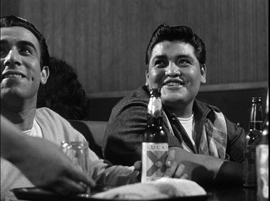
Mackenzie's film is doubly important because it captures a piece of L.A. history that was swept away half a century ago. Civic redevelopment projects wiped out entire neighborhoods deemed community eyesores. Bunker Hill was home to a large population of elderly retirees and pensioners. Yes, the unimproved properties had low rents and many were in poor shape -- the neighborhood is pictured as the hangout of down 'n' outers in noirs like Criss Cross, Act of Violence and Kiss Me Deadly. But neighborhoods just as old are still standing all over Los Angeles. The city condemned the entire hill, graded it down and waited for bids from big developers. The same thing happened to Chavez Ravine, adjacent to The Exiles' "Hill X". The Mexican-American population there was forcibly removed so the area could be developed as Dodger Stadium. What was a college student doing making a picture like The Exiles in 1957? It's true that film studies and film schools weren't that well known in the 1950s but both UCLA and U.S.C. had film programs going not soon after the end of WW2. At the time neither school was considered a conduit into the film industry, as is the perception now (for a few exceptionally talented or well-connected graduates, that is). The obvious career destination for Kent MacKenzie was in industrial, educational and television documentaries, which at the time were heavily subsidized. Milestone's 2-Disc DVD of The Exiles contains a terrific encoding of this impressive production. Excepting spotty engagements and festival showings, it has gone largely unseen for over 50 years. The extras gather plenty of filmic and audio evidence that further demonstrate Kent MacKenzie's special talents, and put the lost neighborhood of Bunker Hill in an even richer context. MacKenzie's U.S.C. film Bunker Hill is a longish docu about the elderly residents of the neighborhood, seemingly making a case for the preservation of a place near downtown where pensioners can live independently and take care of each other. 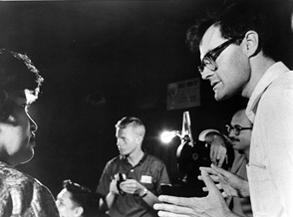
Other short films by MacKenzie show him continuing with ethnographic subject matter. A long-form docu about the rodeo is produced by David Wolper, a very influential producer of the 60s and 70s. One nicely-made public education docu called A Skill for Molina depicts a man with a large family working hard to get schooling in engineering and construction skills. It stresses patience and understanding, and could easily convince a discouraged man that government programs exist to help him train for a good job. The Exiles carries a commentary by Native American author and filmmaker Sherman Alexie and esteemed colleague critic Sean Axmaker. They also appear in a separate 38-minute audio interview. A public radio audio extra features Alexie and filmmaker Charles Burnett; another audio-only piece covers the film's opening night re-premiere and includes introductory remarks by a representative of the U.C.L.A. Film Archive. An additional 23-minute film on Bunker Hill is by Greg Kimble. A third is Robert Kirste's brief The Last Day of Angels Flight, which documents the railway's final day of operation. The buildings on all sides are already gone; a voiceover talks about how easy it was to go all over L.A. on the light-rail Red Cars. Also included is an excerpt from Thom Andersen's Los Angeles Plays Itself, a compilation of movie clips featuring vintage scenes in the City of the Angels. 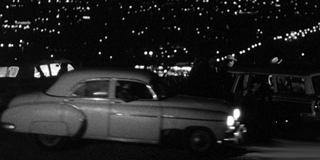
The second disc carries a still gallery and DVD-ROM text extras -- film scripts, publicity material, etc.. Film students and independent filmmakers will be fascinated by Kent MacKenzie's thesis paper recounting the making of The Exiles. MacKenzie passed away in 1980, and one of the text extras is the script of his final, unfinished film. The miracle of The Exiles is that film student MacKenzie would choose for his subject a place and a subculture that would be gone in just a couple of years. The film is an historical time machine that presents a vivid portrait of L.A. life outside our usual reference of commercial filmmaking. At one point the foursome in the convertible joy-ride through the Third Street tunnel playing The Revels at full volume, drinking out in the open and laughing their heads off. One angle on the girl riding shotgun shows her grinning while sparks from her cigarette blow back down the tunnel. It's a key image of American independent filmmaking -- it's like we're there.
On a scale of Excellent, Good, Fair, and Poor,
The Exiles rates:
Reviews on the Savant main site have additional credits information and are often updated and annotated with reader input and graphics. Also, don't forget the 2009 Savant Wish List. T'was Ever Thus.
Review Staff | About DVD Talk | Newsletter Subscribe | Join DVD Talk Forum |
| ||||||||||||||||||